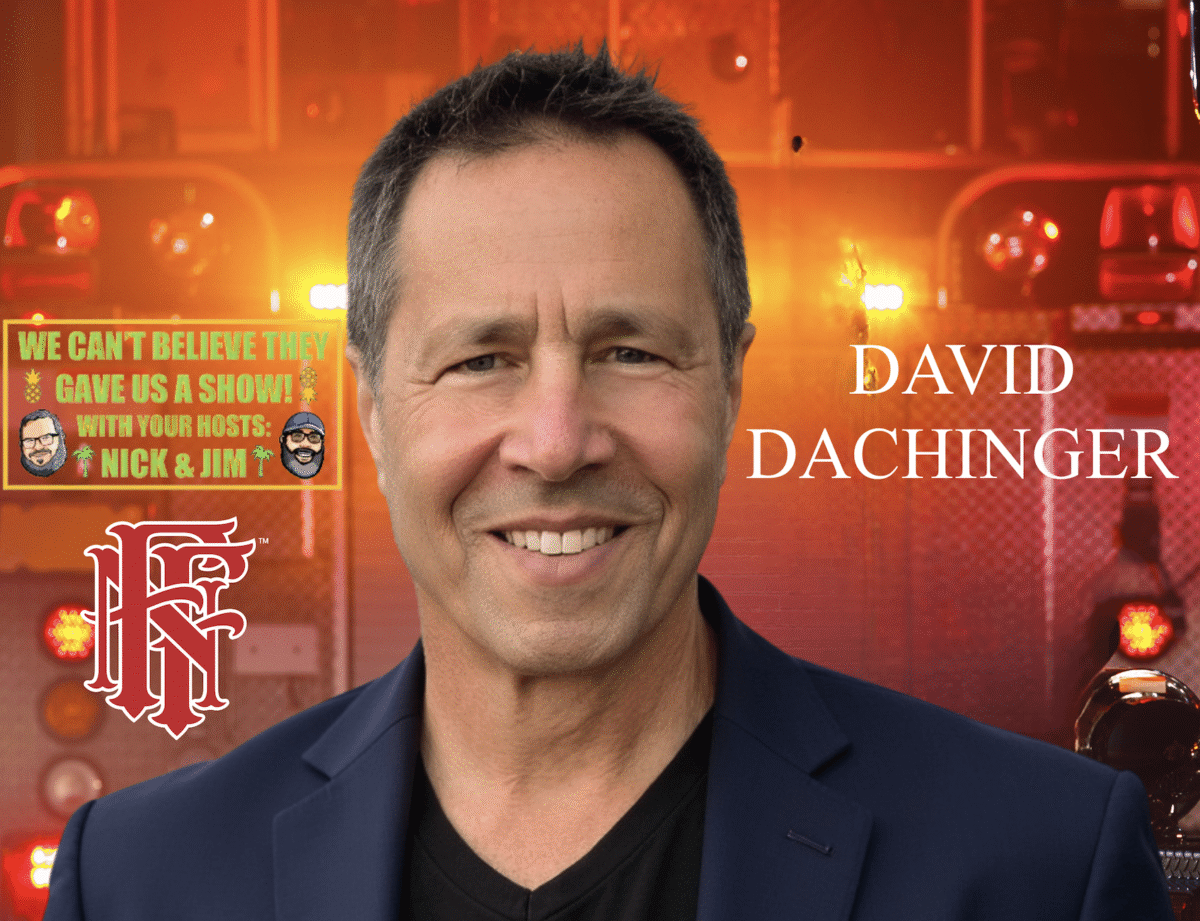Podcast: Play in new window | Download
Subscribe: RSS
In this episode of We Can’t Believe They Gave Us a Show, hosts Jim Burneka and Nick Magoteaux welcome guest (and fellow podcaster) David Dachinger. Dachinger, the host of Igniting the Shift Within, talks about the challenging transition from frontline firefighting to retirement. He shares his personal journey of leaving emergency response, navigating the loss of purpose, and finding new meaning through peer coaching with 22Zero, an organization dedicated to healing trauma in first responders.
1. RETIREMENT IS A SIGNIFICANT TRANSITION THAT REQUIRES A PLAN—AND FLEXIBILITY.
Dachinger’s story underscores how retirement from firefighting is more than just stepping away from the job—it’s an epic life event that demands mental, emotional, and practical preparation. Dachinger retired in June 2021, initially with a clear plan to engage in meaningful work producing stress-reduction videos for a prisoner population in Los Angeles. When that plan fell through, he found himself scrambling to redefine his purpose. His solution was launching the Responder Resilience podcast, which opened doors to new communities and perspectives within first responder circles—from wildland firefighters to animal control officers. This experience helped replace the loss of daily mission-driven work and kept his “tribe” connection intact.
What stands out is the acknowledgment that many firefighters retire without a plan beyond “I’ll know it when I get there.” Dachinger notes the emotional turmoil of leaving the adrenaline-driven environment of the firehouse, especially when the rush of helping others suddenly disappears. Asking, “What’s plan B?” is crucial, and having the flexibility to pivot when plan A doesn’t pan out can make all the difference in finding fulfillment post-retirement.
2. MENTAL HEALTH INTERVENTIONS MUST BE ACCESSIBLE, IMMEDIATE, AND TAILORED TO FIRST RESPONDERS.
Dachinger’s work as a peer coach with 22Zero highlights the importance of trauma-informed mental health support uniquely suited for first responders. This nonprofit offers a free, no-insurance-required intervention aimed at rewiring trauma responses through approaches that share similarities with EMDR, without requiring survivors to relive their traumatic stories repeatedly.
The podcast emphasizes that many first responders wait too long before seeking help, often when their mental health is severely compromised. Sanger stresses the urgency of effective “one-shot” interventions because if that initial help isn’t the right fit, many will simply give up. This reality makes culturally competent, fast-acting care critical.
His solution was launching the Responder Resilience podcast, which opened doors to new communities and perspectives within first responder circles—from wildland firefighters to animal control officers. This experience helped replace the loss of daily mission-driven work and kept his “tribe” connection intact.
What stands out is the acknowledgment that many firefighters retire without a plan beyond “I’ll know it when I get there.” Dachinger notes the emotional turmoil of leaving the adrenaline-driven environment of the firehouse, especially when the rush of helping others suddenly disappears. Asking, “What’s plan B?” is crucial, and having the flexibility to pivot when plan A doesn’t pan out can make all the difference in finding fulfillment post-retirement.
2. MENTAL HEALTH INTERVENTIONS MUST BE ACCESSIBLE, IMMEDIATE, AND TAILORED TO FIRST RESPONDERS.
Dachinger’s work as a peer coach with 22Zero highlights the importance of trauma-informed mental health support uniquely suited for first responders. This nonprofit offers a free, no-insurance-required intervention aimed at rewiring trauma responses through approaches that share similarities with EMDR, without requiring survivors to relive their traumatic stories repeatedly.
The podcast emphasizes that many first responders wait too long before seeking help, often when their mental health is severely compromised. Sanger stresses the urgency of effective “one-shot” interventions because if that initial help isn’t the right fit, many will simply give up. This reality makes culturally competent, fast-acting care critical.
3. FINDING PURPOSE AFTER FIREFIGHTING CAN BE A JOURNEY OF GROWTH AND REDISCOVERY.
The hosts, along with Dachinger, reflect on how their careers evolved after retirement or during difficult health battles, such as cancer diagnoses. Dachinger’s candor about walking around with stage 4 cancer without knowing it is sobering, but also inspiring. His focus on faith, the support of his union brothers, and the caregiver role his wife played reveal how a crisis can shift one’s outlook profoundly.
Following treatment, Dachinger and his wife coauthored Live Calm With Cancer and Beyond to channel their experience into something positive for others facing similar struggles. This act of “paying it forward” represents a common theme in firefighter culture—a drive to serve, even when the uniform no longer fits.
The discussion also touched on the importance of humor and lighthearted moments in balancing heavy subjects like cancer and PTSD.

